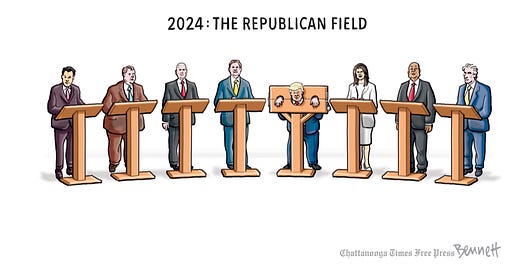To Cover Or Ignore
Should media cover Trump's outrageous behavior or ignore him? The debate rages.
As the campaign season begins in earnest, it’s time for my annual reminders about why the media is not your friend, and how to be a more discerning media consumer. When the media consisted of three networks and your daily newspaper, believe it or not, they tried really hard to get it right, and tilting stories to assure a desired outcome was strictly verboten. People got fired for tilting, shading, or putting a thumb on the scale. People got bonuses for scooping their competitors. Accurately getting the story out first was the holy grail. Fast and accurate was lauded; opinionated and wrong was dismissed. Times have changed.
The problem today is that not all outlets care about the truth. Fragmentation, and the growing number of platforms, left and right, that are attached to a particular outcome means you have to be your own editor, and use multiple sources to divine the truth. It means more work for you. Here’s a perfect example: The Wall Street Journal, Washington Post, New York Times, Associated Press, ABC, NBC and CBS all reported that President Biden was deeply engaged and made the Hamas/Israel hostage deal happen when it looked like the longest of longshots. Simultaneously, Breitbart reported that Biden’s incompetence nearly killed the deal. The newspapers and networks had extensive interviews with foreign affairs specialists, senior State Department officials, and Qatari, Egyptian, and Israeli foreign ministries. Breitbart forwarded opinion masquerading as fact.
If the consumer doesn’t know that Breitbart is a radical conservative opinion platform, and that it doesn’t have reporters stationed all over the world, they might not recognize opinion dressed as fact. Right-wing media has become pretty effective at casting aspersions on traditional media. Remember Kellyanne Conway and her “alternative facts”?
None of this even begins to address how the media should deal with an ex-president whose grandiosity never fails to lead him into boxed-canyons of provocative and untrue statements involving personal insults and calls to violently defend him. He says something outrageous, and the media dines on it. Because of both his temperament and his never-apologize nature, once backed into a corner, he doubles down, and gets a second helping of coverage, leaving little for his primary competitors.
Going back to 2016, when Donald Trump meant ratings and revenue gold, the reality star-cum-politician made news when he tied his shoes. They simply couldn’t get enough of him. Recognizing that their zeal to garner ratings had tilted the playing field in his favor with something less than spectacular outcomes for both the truth and democracy, the mainstream media has tried to wean itself from the Trump circus with varying results.
Mental health experts are having a furious debate about the way the media covers the former president. They know that his rhetoric has become more incendiary and violent as the years have passed, and as he has descended more deeply into an apparently bottomless narcissism.
Times writer, Thomas B. Edsel, interviewed Joshua Miller, a professor of psychology at the University of Georgia, who said he is concerned that our focus on Trump‘s narcissism ignores his deeper pathologies. I must admit, I had to sit down after I read that. How, I thought, can it be worse than it already is?
Where, wonder Nikki Haley, Ron DeSantis, Chris Christie, and the other competitors who are languishing in the distance behind Trump, is our coverage? They don’t lie and instead talk policy—a real yawner in comparison.
The currently prevailing wisdom in Media World is to downplay Trump‘s outrageous declarations that support authoritarianism and assault democracy. Some mental healthcare professionals think it’s time to shine a light on the Hitler-like rhetoric of calling American citizens “vermin“ rather than continuing to ignore it, and sweeping it under the rug.
Edsel also spoke to Donald R. Lynam, a professor of psychology at Purdue. Grandiose narcissists, he said, “feel they are special and that normal rules don’t apply to them. They require attention and admiration.” He added, “This behavior is also consistent with psychopathy, which is pretty much grandiose narcissism plus poor impulse control.”
Other mental healthcare professionals expressed concern that as Trump ages, he is losing cognitive ability as well as impulse control. It was his recent comments that Joe Biden is going to lead us into World War II, or that he had beaten Barack Obama for the presidency, that has them most unnerved. So, these medical professionals wonder, why doesn’t the media recognize the danger and expose it on a continuing basis.
Perhaps media has gone from too much Trump to too little. Brian Klaas, a political scientist at University College London, believes that the real story of the 2024 presidential election is Donald Trump‘s deteriorating mental health: “That is the story of the 2024 election. Everything else is just window dressing.”
So, cover or ignore—that is the question.
©2023 Jon Sinton




Amen, sister.
Grandiose narcissism plus poor impulse control pretty much sums it up.